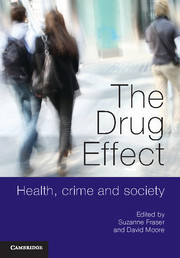Book contents
- Frontmatter
- Contents
- List of contributors
- Acknowledgements
- Introduction
- Part 1 Drug use as social and cultural practice
- Part 2 Drugs, health and the medicalisation of addiction
- Part 3 Drugs, crime and the law
- 9 Court-ordered treatment, neoliberalism and Homo economicus
- 10 Cannabis in cultural and legal limbo
- 11 Drugs, crime and the law in Australia
- 12 Reconceptualising harm reduction in prisons
- 13 Possessed
- Index
- References
10 - Cannabis in cultural and legal limbo
Criminalisation, legalisation and the mixed blessing of medicalisation in the USA
from Part 3 - Drugs, crime and the law
- Frontmatter
- Contents
- List of contributors
- Acknowledgements
- Introduction
- Part 1 Drug use as social and cultural practice
- Part 2 Drugs, health and the medicalisation of addiction
- Part 3 Drugs, crime and the law
- 9 Court-ordered treatment, neoliberalism and Homo economicus
- 10 Cannabis in cultural and legal limbo
- 11 Drugs, crime and the law in Australia
- 12 Reconceptualising harm reduction in prisons
- 13 Possessed
- Index
- References
Summary
Use of cannabis or marijuana is a cultural practice that is both common and criminalised. This contradiction has helped spark a growing drug policy reform movement in the USA. Reformers have successfully exposed the high costs and ineffectiveness of punitive prohibition as the dominant drug policy paradigm. As alternatives to criminalisation, reformers have advocated rights-based legalisation, which has not been adopted, and health-based harm reduction strategies, which have enjoyed growing acceptance. Drug policy reformers generally regard various forms of medicalisation as unequivocally positive, both more effective in terms of public health and more humane. These include syringe exchanges; medical marijuana; and addiction treatment in lieu of incarceration, including ‘drug courts’ that practice ‘therapeutic jurisprudence’.
In this chapter, however, I suggest that medicalisation is not a conceptually coherent alternative to criminalisation and that medicalisation discourses are multivalent – as easily deployed by prohibitionists in support of continued criminal punishment for drug use as they are by drug policy reformers in support of legalisation. Shifting the frame around drugs from criminal law to public health has much to recommend it, but this move foregrounds addiction-as-disease and pushes normal drug use into the shadows as deviance, which paradoxically may constrain drug policy reform in the long run.
- Type
- Chapter
- Information
- The Drug EffectHealth, Crime and Society, pp. 171 - 188Publisher: Cambridge University PressPrint publication year: 2011
References
- 4
- Cited by

